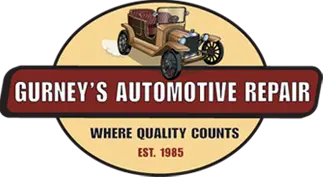
At Gurney’s Automotive Repair, we understand how stressful it can be when your check engine light suddenly turns on. It’s easy to feel uncertain—particularly when you’re unsure what’s behind the warning or how serious it might be. That’s where we come in.
Understanding the common reasons behind a check engine light can give you clarity and help you make confident choices about your car’s care. Our team is committed to providing accurate diagnostics, clear explanations, and trusted repairs that keep you on the road with confidence.
Why the Check Engine Light Shouldn’t Be Ignored
Your vehicle’s onboard diagnostic system activates the check engine light when it detects a problem. When it illuminates, your car’s computer has detected something abnormal in the engine, emissions system, or another key component. Not every alert signals an emergency, but it’s important to have it looked at promptly to avoid more costly repairs later on.
Below are some of the most frequent engine-related repairs we handle at our shop.
1. Loose or Damaged Gas Cap
It may seem insignificant, but a damaged or improperly sealed gas cap is a surprisingly frequent reason for the check engine light to turn on. Fortunately, this is often a quick fix—but it serves as a valuable reminder that even small components play a role in your vehicle’s performance.
2. Catalytic Converter’s
The catalytic converter helps minimize harmful emissions. When it fails, your vehicle may experience reduced performance and fail emissions testing. This repair tends to be on the higher end of the cost scale and is often the result of long-term issues like unresolved misfires or failing sensors.
3. Oxygen Sensor’s
Oxygen sensors monitor the amount of oxygen in the exhaust system to ensure optimal fuel efficiency and emissions performance. A faulty sensor can lower gas mileage and increase pollutants. Although it’s a relatively straightforward fix, neglecting it can lead to bigger concerns.
4. Ignition Coil and Spark Plug’s
If you’ve noticed misfires, rough idling, or difficulty starting, worn ignition coils or spark plugs could be the cause. Replacing them helps your engine run smoothly and prevents additional damage to components like the catalytic converter.
5. Mass Air Flow (MAF) Sensor’s
The MAF sensor calculates how much air enters your engine and adjusts the fuel delivery accordingly. A malfunctioning sensor may result in poor acceleration, reduced fuel economy, or stalling. Regular air filter changes can help prevent buildup that affects this part’s performance.
6. EVAP Purge Control Valve’s
Your vehicle’s EVAP system prevents gasoline vapors from escaping into the air. When the purge control valve fails, it can trigger the check engine light and impact emissions. While it may not affect drivability, it’s still something to address promptly.
7. Ignition Coil’s
In some cases, the ignition coil fails independently, even when the spark plugs are still functioning properly. When that happens, you might experience a loss of power or uneven engine performance. Taking care of the issue early can help prevent further wear on the engine.
8. Fuel Injector’s
Fuel injectors are responsible for spraying the precise amount of fuel into the engine for efficient combustion. When they’re dirty or malfunctioning, the engine may hesitate, misfire, or lose power during acceleration. These issues are more likely to appear in older vehicles or those that haven’t been maintained regularly.
9. Thermostat’s
A failing thermostat can lead to an engine that runs too hot or too cold. This repair recently made the top ten list, reflecting how aging vehicles are experiencing broader mechanical wear as owners hold onto them longer.
10. Powertrain Control Module (PCM) Reprogramming
In some cases, the vehicle’s computer simply needs updated programming. Software-related errors can trigger warning lights, but reprogramming the PCM is a relatively affordable fix that can restore proper function without replacing any parts.
The Value of Timely Diagnostics
Putting off a check engine inspection may not seem like a big deal, but even minor problems can escalate quickly. For instance, ignoring a faulty oxygen sensor could ultimately lead to a damaged catalytic converter—an outcome that’s far more expensive and avoidable.
Keeping up with scheduled maintenance like oil changes, filter replacements, and fluid checks goes a long way toward preventing many of these warning lights from appearing. Proactive care helps your vehicle last longer and operate more efficiently, especially as the average age of cars on the road continues to rise.
Count on Gurney’s for Honest, Reliable Repairs
We know that unexpected dashboard lights can be intimidating. That’s why we take the time to explain what’s happening under the hood and outline your options without pressure. Our ASE-certified technicians use the latest diagnostic equipment to identify problems quickly and accurately, so you’re never left guessing.
Whether you’re in Nashua or Milford, we’re proud to be your trusted neighborhood auto repair shop—one that treats every vehicle with care and every customer with respect. If your check engine light is on, don’t wait. Give us a call or schedule a visit today. We’ll take care of the problem and help you drive away with confidence.


